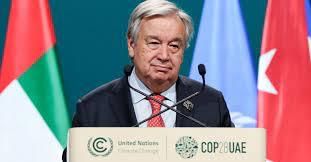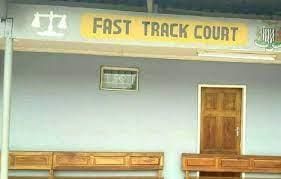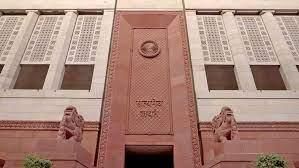Indian Polity and Governance - 6 | Current Affairs & Hindu Analysis: Daily, Weekly & Monthly - UPSC PDF Download
| Table of contents |

|
| Arbitration Agreement |

|
| Article 99 Of The Un Charter |

|
| Fast Track Special Courts |

|
| Terms of Reference for 16th Finance Commission |

|
| Fourth Phase Roll-Out of GIAN Scheme |

|
Arbitration Agreement
The Supreme Court of India has established that an arbitration agreement can be enforceable on companies that did not sign the agreement under the 'group of companies' doctrine.
This doctrine holds that an arbitration agreement can apply to a company that, while not a signatory, is a member of a group of companies that is party to the agreement.
- The ruling maintains the corporate separateness of group companies while establishing the common intention of parties to bind a non-signatory party to the arbitration agreement.
- The court clarified that the definition of “parties” under the Arbitration Act includes both signatory and non-signatory parties, and the requirement for a written arbitration agreement does not exclude the possibility of binding non-signatory parties.
The judgment stemmed from a plea filed by Cox and Kings Ltd in a dispute related to an arbitration agreement.
Article 99 Of The Un Charter
- Recently, the Secretary-General of the United Nations, Antonio Guterres, utilized Article 99 of the UN Charter.
- This action was taken to alert the UN Security Council about the risks associated with Israel's activities in Gaza. The purpose is to emphasize the urgent need to avert a significant humanitarian crisis in the region.
What does Article 99 of the UN Charter entail?
- Article 99 is a provision embedded in the United Nations Charter, which functions as the constitution of the U.N.
- It authorizes the secretary-general to draw the attention of the Security Council to matters that, in their judgment, could pose a threat to international peace and security.
- Article 99 is discretionary, giving the Secretary-General the authority to spotlight crucial issues, and it mandates the attention of the Security Council when invoked.
- This article has been used sparingly in the past, with previous instances including addressing the turmoil in the Republic of the Congo in 1960, Tunisia's grievance against France's military actions in 1961, and the establishment of Bangladesh in 1971.
United Nations Charter
- The United Nations Charter, signed on June 26, 1945, in San Francisco and effective from October 24, 1945, serves as the foundational document of the UN.
- Given its distinctive international nature and the authorities conferred by its Charter, the UN is empowered to address a broad spectrum of issues. The Charter is acknowledged as an international treaty, making it a cornerstone of international law that binds UN Member States.
- The International Court of Justice (ICJ), the principal judicial entity of the United Nations, functions in accordance with its Statute, which is an inseparable component annexed to the UN Charter.
Fast Track Special Courts
The Union Cabinet recently granted approval for the extension of the Fast Track Special Court (FTSCs) for an additional three years until 2026. Initially launched in October 2019 for a one-year term, the initiative was later extended for an extra two years, lasting until March 2023.
What is a Fast Track Special Court (FTSCs)?
Overview:
- FTSCs are specialized courts established in India with the primary objective of expediting the trial process for cases related to sexual offenses, particularly those falling under the purview of the Protection of Children from Sexual Offences Act (POCSO Act) and instances of rape.
- The establishment of FTSCs was prompted by the government's acknowledgment of the alarming frequency of sexual offenses and the prolonged duration of trials in regular courts, leading to delayed justice for victims.
Inception:
- The Central Government enacted the Criminal Law (Amendment) Act in 2018, introducing stricter punishments, including the death penalty for rape offenders. Subsequently, FTSCs were set up to ensure the prompt dispensation of justice in such cases.
Centrally Sponsored Scheme:
- The scheme to establish FTSCs was formulated in August 2019 as a Centrally Sponsored Scheme following directions from the Supreme Court of India in a suo moto Writ Petition (Criminal).
Ministry Involved:
- Implemented by the Department of Justice, Ministry of Law & Justice.
Achievements So Far:
- Thirty States/Union Territories have participated in the Scheme, operationalizing 761 FTSCs, including 414 exclusive POCSO Courts. These courts have successfully resolved over 1,95,000 cases, supporting State/UT Government efforts to deliver timely justice to victims of sexual offenses, even in remote and far-flung areas.
What are the Challenges Related to Fast Track Special Court?
Inadequate Infrastructure and Low Disposal Rate:
- Special courts in India often suffer from the same challenges as regular courts, as they are usually designated rather than established as new infrastructure.
- This leads to overburdened judges who are assigned other categories of cases in addition to their existing workload without the necessary support staff or infrastructure.
- Consequently, the disposal rate of cases in these special courts slows down.
- The envisioned target of clearing around 165 POCSO cases per year per court has significantly fallen short, with each of the over 1,000 FTSCs in the country currently clearing only 28 cases on average annually.
Prolonged Pendency:
- Over 2.43 lakh POCSO cases pending trial in FTSCs as of 31st January 2023.
- Projections indicate several decades are required to clear backlogs in states like Arunachal Pradesh, Delhi, Bihar, West Bengal, Uttar Pradesh, and Meghalaya.
- Estimated trial durations vary significantly across states, with projections ranging from 21 to 30 years.
Conviction Rate Challenges:
- Despite the intended completion of trials within one year, the research reveals a low conviction rate.
- Out of 2,68,038 cases under trial, only 8,909 resulted in convictions, raising concerns about the efficacy of FTSCs.
Limited Jurisdiction:
- These courts are established with a specific jurisdiction, which can limit their ability to deal with related cases. This can lead to delays in justice delivery and a lack of consistency in the application of laws.
- Ideally, cases in these special courts should be disposed of within a year. However, as of May 2023, Delhi had only disposed of 1,049 cases out of a total of 4,369 pending cases. This indicates a significant lag in meeting the target.
Vacancies and Lack of Training:
- The lack of judges due to vacancies affects the courts' capacity to handle cases effectively.
- As of 2022, lower courts across India had a vacancy rate of 23%.
- Regular judges from normal courts are often deputed to work in FTSCs.
- However, these courts require judges with specialized training to handle cases quickly and effectively.
Prioritization of Certain Offences Over Others:
- The establishment of special courts in India is often determined by ad-hoc decisions made by both the judicial and executive branches of government.
- This approach means that certain categories of offences are arbitrarily prioritised for faster disposal over others.
Way Forward
- FTSCs require sufficient infrastructure, encompassing courtrooms, support staff, and modern technology, to guarantee seamless and efficient operations.
- Additional funding should be earmarked to establish and sustain these specialized courts.
- To expedite case resolution, FTSCs should prioritize rigorous case management, minimizing unwarranted delays attributed to adjournments and ensuring the timely submission of evidence.
- Specialized training programs for judges and support staff can streamline procedures and expedite the pace of proceedings.
- Immediate action is needed to promptly fill vacancies and ensure that judges possessing relevant expertise are appointed to these courts.
Terms of Reference for 16th Finance Commission
The Union Cabinet has approved the terms of reference (ToR) for the Sixteenth Finance Commission, which plays a crucial role in recommending the formula for revenue distribution between the Centre and the States for the next five-year period starting from April 1, 2026.
What are the Key Terms of Reference for the 16th Finance Commission?
- Allocation of Tax Proceeds: Recommending the distribution of taxes between the Union Government and the States, as outlined in Chapter I, Part XII of the Constitution. This involves allocating shares among the States from these tax proceeds.
- Principles for Grants-in-Aid: Establishing the principles governing grants-in-aid to the States from the Consolidated Fund of India. This includes determining the amounts to be provided to the States as grants-in-aid, particularly under Article 275 of the Constitution, for purposes beyond those specified in the provisos to clause (1) of that article.
- Boosting State Funds for Local Bodies: Identifying measures to augment the Consolidated Fund of a State. This aims to supplement the resources available to Panchayats and Municipalities within the State based on recommendations from the State's own Finance Commission.
- Evaluation of Disaster Management Financing: The Commission may assess the current financing structures related to Disaster Management initiatives. This involves a thorough examination of the funds established under the Disaster Management Act, 2005, and presenting suitable recommendations for enhancements or alterations.
Note
'Population (1971)' was considered only for the 14th Finance Commission, while 'Population (2011)' and 'Tax and fiscal efforts' were introduced by the 15th Finance Commission. The figures represent the weightage in percentage for each criterion during the specified periods.
Key Recommendations of 15th Finance Commission:
- Share of States in Central Taxes: The Commission proposed maintaining the states' share in central taxes at 41% for the 2021-26 period, a slight reduction from the 42% allocated during 2015-20 by the 14th Finance Commission.
- This 1% adjustment aims to accommodate the newly formed union territories of Jammu and Kashmir and Ladakh from the central resources.
- Fiscal Deficit and Debt Levels: The Commission recommended that the Centre aims to limit its fiscal deficit to 4% of GDP by 2025-26.
- For states, it advised specific fiscal deficit limits as a percentage of Gross State Domestic Product (GSDP) for different years within the 2021-26 period.
- States not fully utilizing the sanctioned borrowing limits in the initial four years (2021-25) can access the remaining amount in subsequent years.
- Other Recommendations:
- Defense and Internal Security Funding: The report suggests establishing a Modernisation Fund for Defence and Internal Security (MFDIS), non-lapsable and funded primarily through the Consolidated Fund of India and other sources.
- Centrally Sponsored Schemes (CSS): Recommendations include setting a threshold for annual CSS allocations, third-party evaluations, transparent funding patterns, and stable financial allocations to phase out redundant schemes.
Conclusion
With the ToRs now approved, the stage is set for the commission to embark on its mandate, contributing decisively to the financial architecture that underpins India's federal structure.
Fourth Phase Roll-Out of GIAN Scheme
Eight years after its establishment, the Ministry of Education is preparing to initiate the fourth phase of the Global Initiative of Academic Networks (GIAN).
About the Global Initiative of Academic Networks (GIAN)
- The Global Initiative of Academic Networks (GIAN) in Higher Education was launched in 2015 as a program of the Ministry of Education.
- Objective: The program aims to harness the expertise of scientists and entrepreneurs globally, encouraging their collaboration with Higher Education institutes in India.
- This initiative seeks to enhance India’s existing academic resources, expedite the implementation of quality reforms, and raise India's scientific and technological capabilities to global standards.
- Key Objectives:
- Improving the quality of higher education through international collaboration.
- Increasing the involvement of distinguished international faculty in Indian academic institutes.
- Introducing international academic excellence to India's higher education institutions.
- Strengthening the country's existing academic resources, expediting the pace of quality reforms, and elevating India's scientific and technological capabilities to global excellence.
- Nodal Agency: IIT Kharagpur
Salient Features of GIAN
- An honorarium is paid to the foreign experts to cover their travels and other expenses.
- Short term courses are conducted by these experts/faculties in Indian Institutions.
- This programme was first launched to establish collaboration between India and The United States of America, but later, the scope of the programme was extended.
- The duration of courses differ for different courses. The minimum duration is one week and the maximum duration is 3 weeks.
- A lump-sum amount of up to US$ 8000 (~ ₹7 lakh) for 12 to 14 hours of contact and up to US$ 12000 (~ ₹12 lakh) for 20 to 28 hours of contact can be paid to the foreign experts covering their travel and honorarium.
Significance of GIAN Programme
- The Central government has spent at least ₹126 crore in payment to support foreign faculty’s travel and honorarium since the inception of GIAN.
- Since the beginning of the scheme in 2015-16, 1,612 foreign faculty members have visited the country to deliver courses from 59 countries.
- As many as 692 (39%) of 1,772 courses were delivered in Indian Institute of Technology (IIT) campuses, while the second largest cohort of lectures, 436 (24.6%), took place in the National Institute of Technology (NITs).
- Up to 41.4% (668) of academicians who visited India belonged to the U.S. The rest consisted of experts from the U.K. (143), Germany (93), Canada (89), etc. Up to 72,000 Indian students directly benefitted.
|
63 videos|5408 docs|1146 tests
|
FAQs on Indian Polity and Governance - 6 - Current Affairs & Hindu Analysis: Daily, Weekly & Monthly - UPSC
| 1. What is an arbitration agreement? |  |
| 2. What is Article 99 of the UN Charter? |  |
| 3. What are fast track special courts? |  |
| 4. What are the terms of reference for the 16th Finance Commission? |  |
| 5. What is the fourth phase roll-out of the GIAN scheme? |  |



















